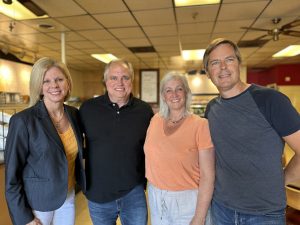When asked where he got the idea for a composting business, Read Admire responds with a laugh before saying, “I was trying my hardest to come up with a job that intersects music and food.” Although composting seems devoid of music, it has a cosmic pull on him, enough to get him business and branding minded.
A recent graduate of the Clinton School of Public Service, Admire is still working out minor kinks in his life plan, although he feels he’s headed in the right direction. He opened The Urban Food Loop this past May, launching with Heifer International’s Feast in the Field event.
For a fee of $31 a month (plus $5 for each composting bin), individuals can fill that bin to the limit at which point it gets whisked off to be composted. “It’s really an inexpensive model and you receive your compost back for your garden,” he explains. Or, if you don’t have a garden, you can always donate the compost to other garden/farm partners.
Admire’s simple, yet solid composting idea has been in the making for nearly a decade. He pinpoints a trip he took to Costa Rica in 2006 as the beginning of his interest. “Down there I worked on an organic farm that created a closed food loop,” he explains, “we grew everything and we composted everything because it was really hard to get anything in or out due to being in the middle of the rainforest.”
This was his first exposure to such a loop, and the experience became ingrained in him as he studied music at UALR, and even went on to take a job cooking on a yoga farm. If asked, he’ll tell you the cooking opportunity was a fluke, as he remembers his response to such an offer, “But I fumble through cookbooks!” He went, nevertheless, finding himself working in a kitchen on a farm located on the Ozark’s Shiloh Mountain. “I never thought I’d be a farmer,” says Admire, but food and farms have a way of pulling him in. Again in this instance, it was hard to move things in and out – although not impossible. There was a gardening system that included compost bins, creating yet another food loop.
As Admire felt called to the Clinton School, he simultaneously fell into a job at Natchez. When he came back to Little Rock telling of all the great benefits of composting at the farm on Shiloh Mountain, South on Main’s David Burnette suggested he meet with Natchez’s Alexis Jones, as the restaurant was in its first year of business.
Come to find out, Burnette had ulterior motives. “He set up this job interview and I didn’t even know,” Admire remembers, “so when I sat down and Alexis had all these papers out, I said, where’s my drink? Dave was over at the bar laughing.”
He took the job, and was immediately steeped in the preparation of really good, from-scratch food. He noticed the amount of scraps that were being thrown out, though, and asked if he could bring in a bin for composting in his garden. He was on the brink of receiving funding from the Clinton Global Initiative to create a composting project with local restaurants when, as luck would have it, his money fell through.
At that point, Admire took a break from composting – with school and his job he had plenty on his mind. One day, however, he was biking through the old Western Hills Country Club Golf Course, a 135 acre patch of land that had been shut down, and was now wildflower and wilderness ridden. After he mentioned this field to a few friends, grants were written and ideas pursued.
Eventually, the Arkansas Hunger Relief Alliance hatched plans to treat the old course like a larger Dunbar Garden, to fit into the organization’s Gleaning Project with the resulting produce going to the food bank. Admire was deeply involved in the new farm, helping where needed. All the while, his composting project was on the backburner as he helped raise over 8,000 lbs. of food, all destined for the food bank.
But things have a way of coming back around. During his final project with the Clinton School, Admire switched his focus back to composting. He quickly found out that Little Rock is not legally set up for composting on a city-wide level like San Francisco or Portland, and that it would require re-engineering and money to get to those levels. Lots of it.
What he did discover from looking towards other cities who implemented city-wide composting programs is that they were initially brought about by the private sector. “The hope is that one day the city will take over the service,” he says, that one day composting in Little Rock and even Arkansas at large will create a sustainable food loop – truly farm to table and back again.
Currently, Admire is composting all his own with pitchfork in hand, but if business picks up, he’s considering getting a tractor, and he has some potential investors lined up.
He’s also taken a legislative interest in composting and urban farming. He’s involved with the Little Rock Urban Agricultural Commission, in which the group is currently exploring policies on urban agriculture. “Maybe we can guide some key decisions,” he says, “although we don’t want to cause problems.”
His passion and zeal for making a difference is downright contagious. His focus of “treating the farmers right” and creating something sustainable is exciting. Get involved and check out his services here.





